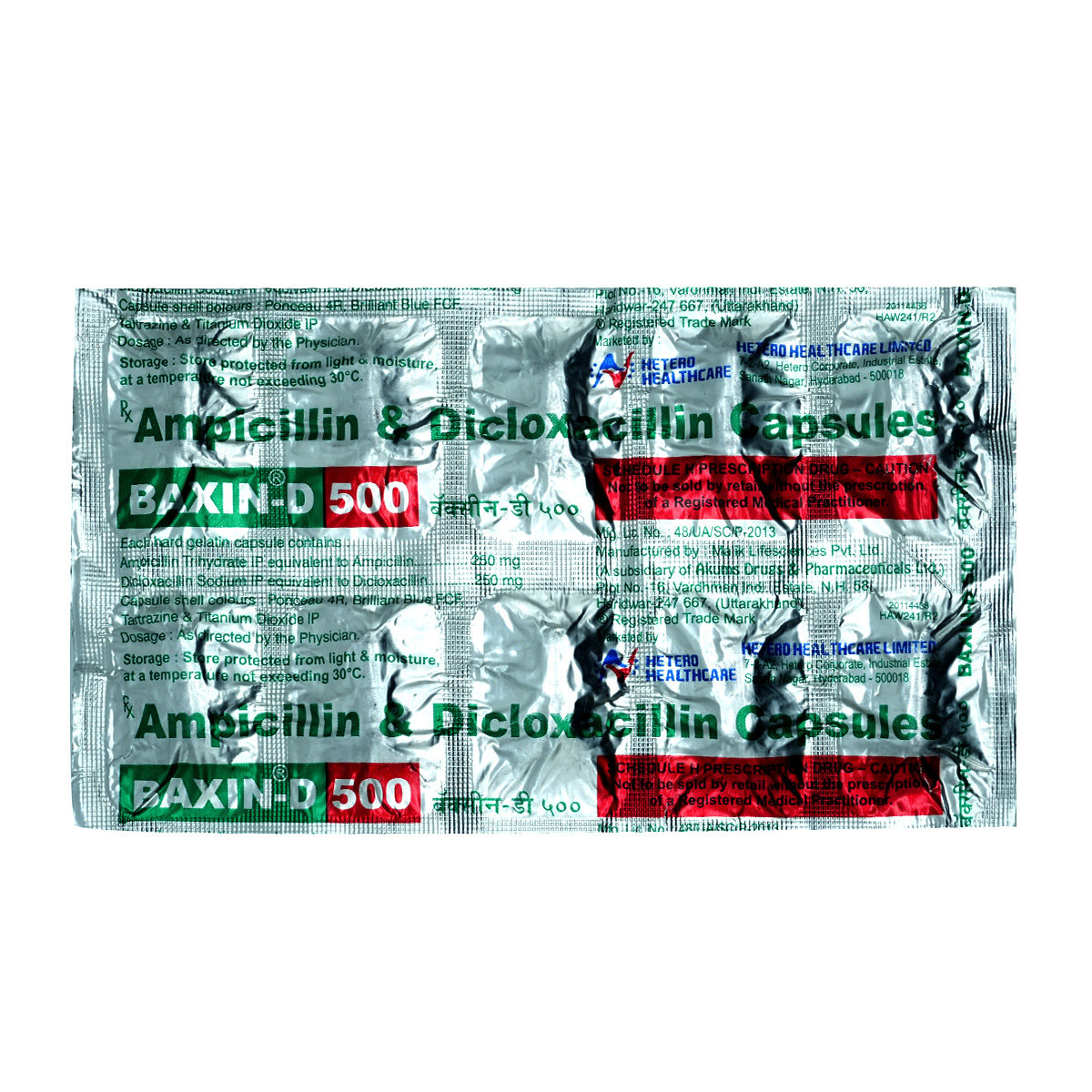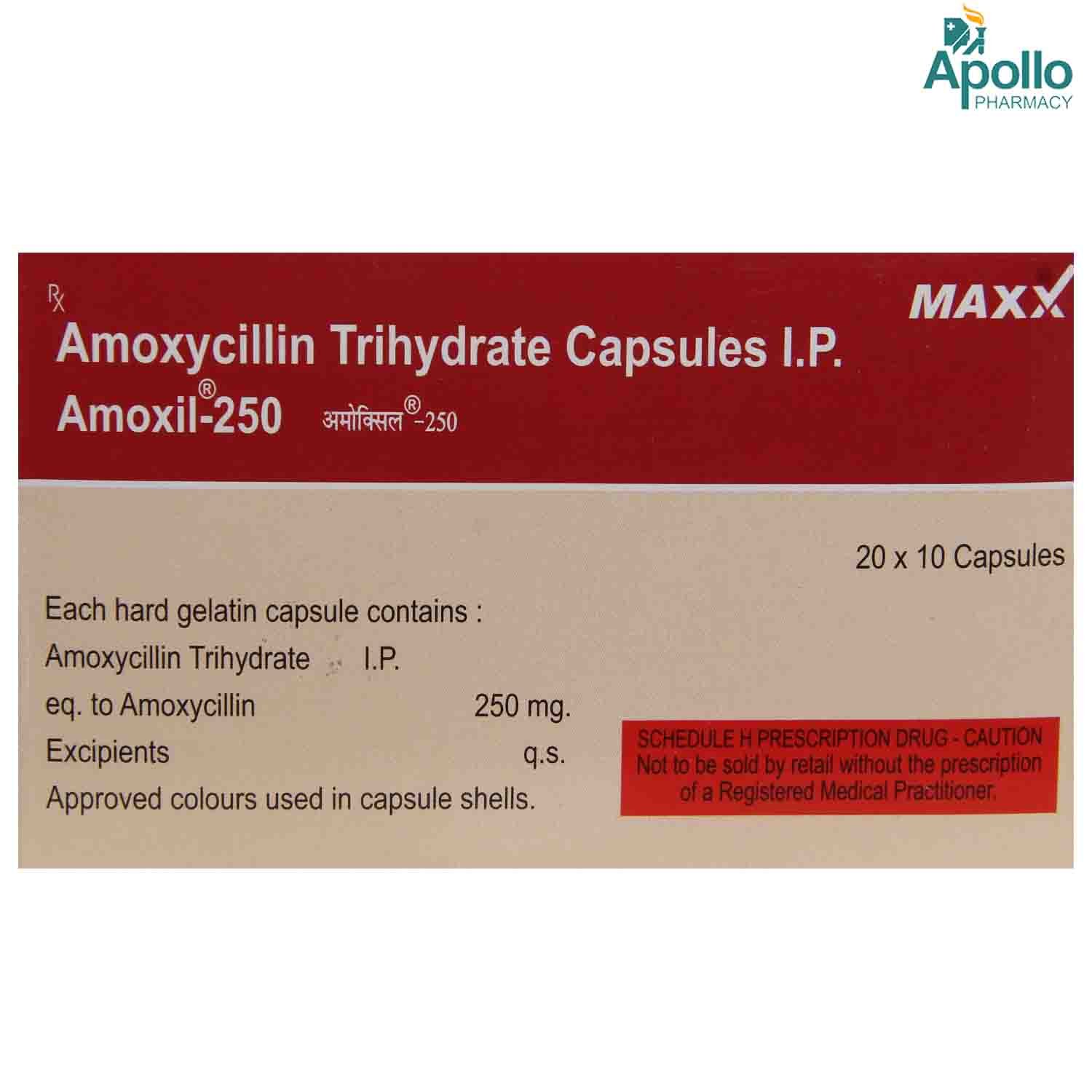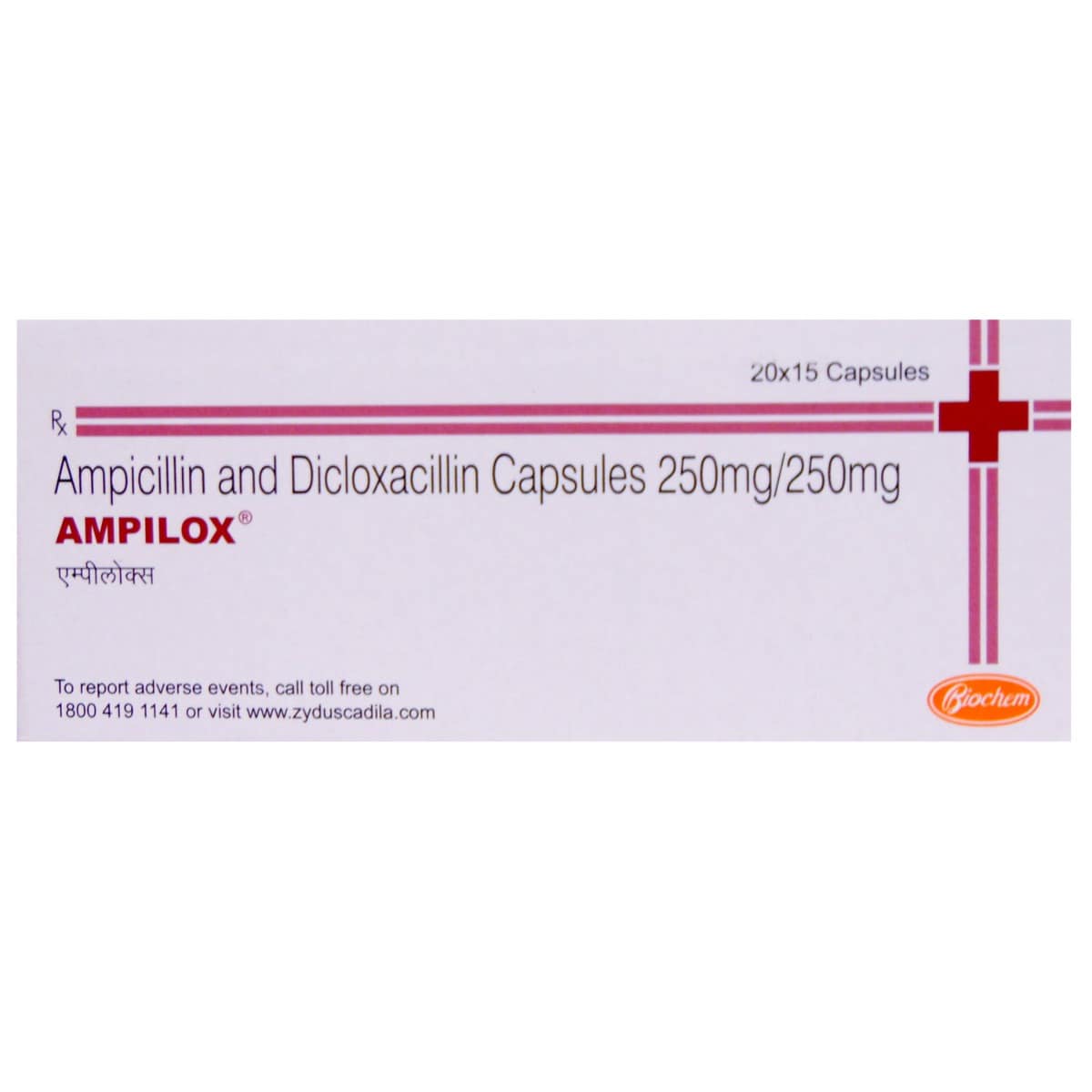Ampicillin+dicloxacillin
About Ampicillin+dicloxacillin
Ampicillin+dicloxacillin belongs to the group of 'penicillin antibiotics' used to treat a wide range of bacterial infections. It is a 'broad-spectrum antibiotic' that treats various bacterial infections of the ear, nose, throat, bones, lungs, and post-operative wound infections. Bacterial infections are caused due to the multiplication of harmful bacteria inside or on the body. These harmful bacteria produce chemicals known as toxins, which can damage tissue and make you sick.
Ampicillin+dicloxacillin contains two penicillin antibiotics, Ampicillin and Dicloxacillin. Ampicillin+dicloxacillin works by preventing the formation of bacterial cell covering, which is necessary for their survival. Thereby, it kills the bacteria and helps in treating and preventing the spread of infections. Ampicillin+dicloxacillin does not work against infections caused by the virus, including cold and flu.
Take Ampicillin+dicloxacillin as advised by your doctor. In some cases, you may experience certain common side effects, such as diarrhoea, rashes, nausea, stomach pain, allergic reaction, and vomiting. Most of these side effects do not require medical attention and will resolve gradually over time. However, you are advised to talk to your doctor if you experience these side effects persistently.
Before starting Ampicillin+dicloxacillin, please inform your doctor if you have any allergy (against any antibiotic) or kidney or liver problems. Do not take Ampicillin+dicloxacillin on your own, as self-medication may lead to antibiotic resistance in which antibiotics fail to act against specific bacterial infections. Avoid taking Ampicillin+dicloxacillin if you are pregnant or breastfeeding unless prescribed by a doctor. Avoid alcohol consumption to prevent unpleasant side effects. Inform your doctor about all the medicines you are taking and your health condition to rule out any unpleasant side effects. Ampicillin+dicloxacillin is used with caution in gastrointestinal diseases.
Uses of Ampicillin+dicloxacillin
Medicinal Benefits
Ampicillin+dicloxacillin is composed of two antibiotics, ampicillin and dicloxacillin. Ampicillin+dicloxacillin is a broad-spectrum antibiotic used to treat various bacterial infections of the ear, nose, throat, bones, lungs, and post-operative wound infections. Ampicillin+dicloxacillin is bactericidal in nature. It is effective against both gram-positive and gram-negative bacteria. Infectious or harmful bacteria can make you sick and reproduce quickly in your body. These harmful bacteria produce chemicals known as toxins, which can damage tissue and make you sick. Ampicillin+dicloxacillin works by preventing the formation of bacterial cell covering, which is necessary for their survival. Thereby, it kills the bacteria and helps in treating and preventing the spread of infections. Ampicillin+dicloxacillin does not work against infections caused by the virus, including cold and flu. Ampicillin+dicloxacillin is used to treat bacterial infections like bacterial meningitis, intra-abdominal infection, urinary tract infection, respiratory tract infection, endocarditis, shigellosis, and typhoid fever.
Directions for Use
Storage
Side Effects of Ampicillin+dicloxacillin
- Diarrhea
- Rashes
- Nausea
- Vomiting
- Stomach pain
- Allergic reaction
- Vomiting
Drug Warnings
Before starting Ampicillin+dicloxacillin, please inform your doctor if you have any allergy to any penicillin antibiotics or kidney or liver problems. Do not take Ampicillin+dicloxacillin on your own, as self-medication may lead to antibiotic resistance in which antibiotics fail to act against specific bacterial infections. Consult your doctor immediately if you experience skin rash or prolonged, significant diarrhoea with abdominal pains. Talk to your doctor before taking Ampicillin+dicloxacillin if you had diarrhea after taking antibiotics or inflammation of the bowel. Avoid taking Ampicillin+dicloxacillin if you are pregnant or breastfeeding unless prescribed by a doctor. Avoid alcohol consumption while taking Ampicillin+dicloxacillin to prevent unpleasant side-effects. Intake of Ampicillin+dicloxacillin may increase the risk of jaundice (liver problem) in newborn babies, so it should only be given after consulting a doctor. Ampicillin+dicloxacillin is not recommended for eye use and is contraindicated. Ampicillin+dicloxacillin should not be given to people with infectious mononucleosis (viral infection with a sore throat and fever) and leukemia (blood cancer).
Drug Interactions
Drug-Drug Interaction: Ampicillin+dicloxacillin may have interaction with antibiotics (chloramphenicol, doxycycline), anticoagulants (warfarin), pain killers (aspirin), vaccines (live cholera vaccine), Anti-hypertensives (atenolol), anti-cancer (methotrexate).
Drug-Food Interaction: Ampicillin+dicloxacillin may interact with grapefruit juice.
Drug-Disease Interaction: Ampicillin+dicloxacillin should be used with caution in kidney diseases, liver, mononucleosis, and gastrointestinal diseases.
Drug-Drug Interactions Checker List:
Safety Advice

Alcohol
cautionLimit consuming alcohol while taking Ampicillin+dicloxacillin to avoid unpleasant side effects.

Pregnancy
cautionPlease consult your doctor if you are pregnant; your doctor will prescribe Ampicillin+dicloxacillin only if the benefits outweigh the risks.

Breast Feeding
cautionPlease consult your doctor if you are breastfeeding; your doctor will decide if Ampicillin+dicloxacillin can be taken by breastfeeding mothers or not.

Driving
not applicableAmpicillin+dicloxacillin does not affect your ability to drive.

Liver
cautionDose adjustment may be needed. Please consult your doctor if you have any concerns regarding this or if you have liver impairment/liver disease before taking Ampicillin+dicloxacillin.

Kidney
cautionDose adjustment may be needed. Please consult your doctor if you have any concerns regarding this or if you have kidney impairment/kidney disease before taking Ampicillin+dicloxacillin.

Children
cautionAmpicillin+dicloxacillin is safe for children if prescribed by a doctor. The dose and duration may vary depending on the age and severity of the infection.
Habit Forming
Diet & Lifestyle Advise
- Antibiotics can alter the useful bacteria in the stomach, which helps indigestion. Therefore, you are advised to take foods rich in probiotics such as yogurt/curd, kefir, sauerkraut, tempeh, kimchi, miso, kombucha, buttermilk natto, and cheese.
- Eat fiber-rich food like whole grains, beans, lentils, berries, broccoli, peas, and bananas.
- Avoid foods rich in calcium, grapefruit, and grapefruit juice, as they might hinder antibiotic absorption.
- Avoid the consumption of alcohol to treat your condition effectively.
- Avoid the usage of tobacco.
- To cure your condition, effectually complete the full course of Ampicillin+dicloxacillin even though you find symptomatic relief.
Special Advise
- If you are about to undergo any blood or urine tests, inform your doctor that you are taking Ampicillin+dicloxacillin as it may interfere with these tests.
- Inform your doctor if you are allergic to penicillin.
Patients Concern
Disease/Condition Glossary
Bacterial infections: A bacterial infection is a condition in which harmful bacteria enter, multiply, and infect our body. It can target any body part and multiply very quickly. When you get infected with bacteria, you can experience generalized symptoms like fevers, chills, and fatigue. Bacteria are of various forms comprising, commonly spherical, rod, and spiral-shaped. Bacterial infections vary from minor illnesses like sore throat and ear infections to severe brain infections like meningitis and encephalitis. Anyone can become infected with a bacterial infection. But, people with weak immune systems or taking immunosuppressive medicine are more prone to bacterial infection.
FAQs
Ampicillin+dicloxacillin contains two penicillin antibiotics, namely: Ampicillin and Dicloxacillin. It works by preventing the formation of bacterial cell covering, which is necessary for their survival. Thus, it kills the bacteria and helps in treating and preventing the spread of infections. Ampicillin+dicloxacillin does not work against infections caused by the virus, including cold and flu.
Diarrhea might be a side-effect of Ampicillin+dicloxacillin. Drink lots of fluids and eat food rich in fiber if you experience diarrhea. If you find blood in your stools (tarry stools) or if you experience prolonged diarrhea with abdominal pain, stop taking Ampicillin+dicloxacillin and consult your doctor. Do not take anti-diarrhea medicine on your own.
It is recommended to complete the course of Ampicillin+dicloxacillin even if you feel better, as it is an antibiotic. Leaving it in between may lead to even severe infection that will, in fact, stop responding to the antibiotic (antibiotic resistance).








